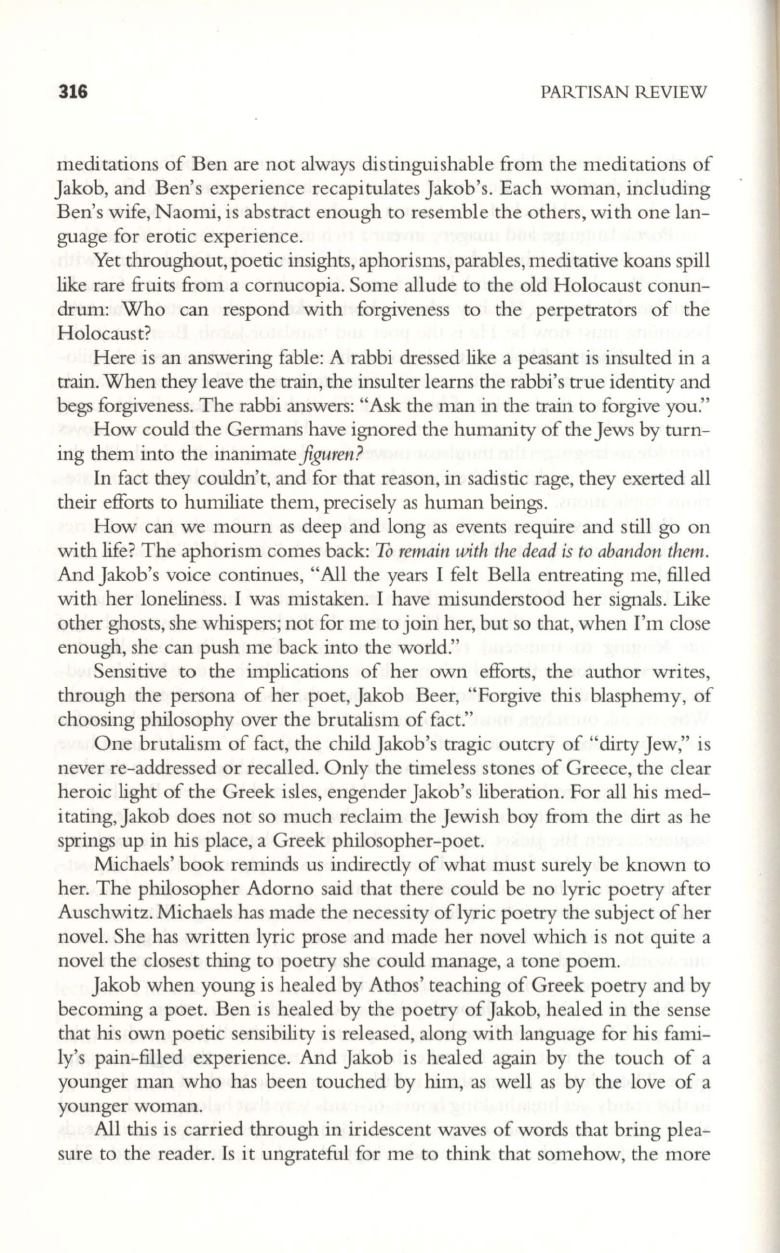
316
PARTISAN REVIEW
meditations of Ben are not always distinguishable from the meditations of
Jakob, and Ben's experience recapitulates Jakob's. Each woman, including
Ben's wife, Naomi, is abstract enough to resemble the others, with one lan–
guage for erotic experience.
Yet throughout, poetic insights, aphorisms, parables, meditative koans spill
like rare fruits from a cornucopia. Some allude to the old Holocaust conun–
drum: Who can respond with forgiveness to the perpetrators of the
Holocaust?
Here is an answering fable: A rabbi dressed like a peasant is insulted in a
train. When they leave the
train,
the insulter learns the rabbi's true identity and
begs forgiveness. The rabbi answers: "Ask the man in the
train
to forgive you."
How could the Germans have ignored the humanity of the Jews by turn–
ing them into the inanimate
figuren?
In fact they couldn't, and for that reason, in sadistic rage, they exerted all
their efforts to humiliate them, precisely as human beings.
How can we mourn as deep and long as events require and still go on
with life? The aphorism comes back:
To
remain with the dead is to abandon them.
And Jakob's voice continues, "All the years I felt Bella entreating me, filled
with her loneliness. I was mistaken. I have misunderstood her signals. Like
other ghosts, she whispers; not for me to join her, but so that, when I'm close
enough, she can push me back into the world."
Sensitive to the implications of her own efforts, the author writes,
through the persona of her poet, Jakob Beer, "Forgive this blasphemy, of
choosing philosophy over the brutalism of fact."
One brutalism of fact, the child Jakob's tragic outcry of "dirty Jew," is
never re-addressed or recalled. Only the timeless stones of Greece, the clear
heroic light of the Greek isles, engender Jakob's liberation. For all his med–
itating,Jakob does not so much reclaim the Jewish boy from the dirt as he
springs up in his place, a Greek philosopher-poet.
Michaels' book reminds us indirectly of what must surely be known to
her. The philosopher Adorno said that there could be no lyric poetry after
Auschwitz. Michaels has made the necessity oflyric poetry the subject of her
novel. She has written lyric prose and made her novel which is not quite a
novel the closest thing to poetry she could manage, a tone poem.
Jakob when young is healed by Athos' teaching of Greek poetry and by
becoming a poet. Ben is healed by the poetry of Jakob, healed in the sense
that his own poetic sensibility is released, along with language for his fami–
ly's pain-filled experience. And Jakob is healed again by the touch of a
younger man who has been touched by him, as well as by the love of a
younger woman.
All this is carried through in iridescent waves of words that bring plea–
sure to the reader. Is it ungrateful for me to think that somehow, the more


